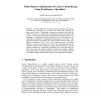Free Online Productivity Tools
i2Speak
i2Symbol
i2OCR
iTex2Img
iWeb2Print
iWeb2Shot
i2Type
iPdf2Split
iPdf2Merge
i2Bopomofo
i2Arabic
i2Style
i2Image
i2PDF
iLatex2Rtf
Sci2ools
100
click to vote
EMO
2001
Springer
2001
Springer
Multi-objective Optimisation of Cancer Chemotherapy Using Evolutionary Algorithms
The main objectives of cancer treatment in general, and of cancer chemotherapy in particular, are to eradicate the tumour and to prolong the patient survival time. Traditionally, treatments are optimised with only one objective in mind. As a result of this, a particular patient may be treated in the wrong way if the decision about the most appropriate treatment objective was inadequate. To partially alleviate this problem, we show in this paper how the multi-objective approach to chemotherapy optimisation can be used. This approach provides the oncologist with versatile treatment strategies that can be applied in ambiguous cases. However, the conflicting nature of treatment objectives and the non-linearity of some of the constraints imposed on treatment schedules make it difficult to utilise traditional methods of multiobjective optimisation. Evolutionary Algorithms (EA), on the other hand, are often seen as the most suitable method for tackling the problems exhibiting such characteris...
Appropriate Treatment Objective | EMO 2001 | Optimization | Patient Survival Time | Treatment Objectives |
Related Content
| Added | 28 Jul 2010 |
| Updated | 28 Jul 2010 |
| Type | Conference |
| Year | 2001 |
| Where | EMO |
| Authors | Andrei Petrovski, John A. W. McCall |
Comments (0)

